Increased DSIP for 2025 despite poor transparency and accountability by DDAs
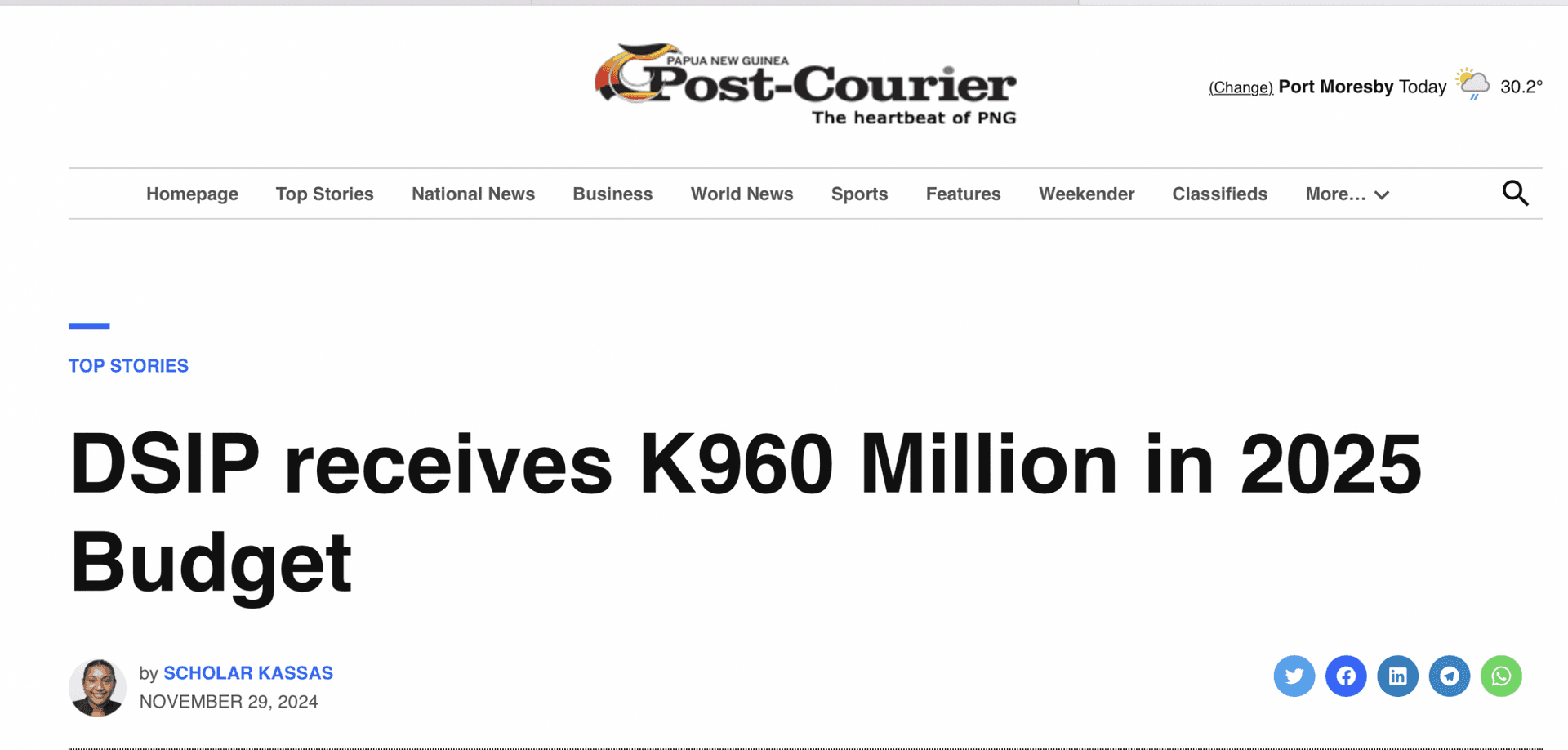
The 2025 National Government budget has seen an increased of budget allocation for district support improvement program (DSIP).
This is despite the fact that DDAs are lacking transparency and accountability in their operations and expenditure.
ACT NOW! analysis has shown that there is lack of DDA contact details, DDAs lack proper development plans and bad records of acquitting funds.
In June 2023, ACT NOW! launched the DDA Watch website with the intention of improving public access to district information and encouraging greater participation in the monitoring of service delivery. The website was meant to publicly make available district plans, district contact details, district acquittals, district development plans and other associated development documents.
1. Lack of contacts Details of DDA CEOs
A concerning analysis by ACT NOW! has revealed that almost all District Development Authorities (DDAs) in Papua New Guinea are failing to make crucial contact information available, hindering governance, accountability, and service delivery.
Despite each district receiving K20 million annually for service and infrastructure improvements. As of July 2024, the analysis reveals most DDA’s do not have a named Chief Executive Officer (CEO) and lack an email address, postal address and phone number or a website. This is essential for constituents to consult and follow up on service delivery.
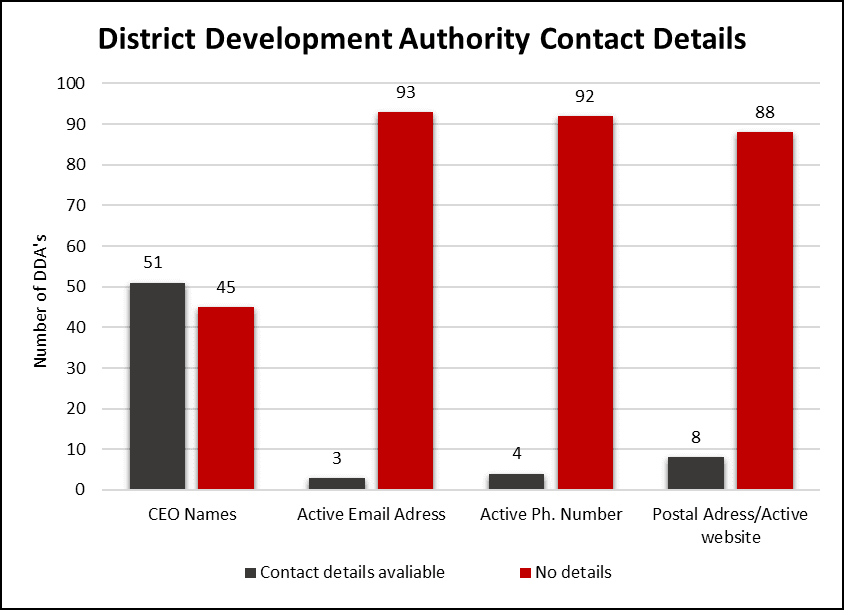
Figure 1. Graph showing information on contact details for 96 districts in PNG
As shown above, of 96 District Development Authorities across the country:
- 45 lack a named CEO;
- 3 have an active email address;
- 4 have a working phone number; and
- 8 have a postal address or website.
i. CEO Names Missing: It’s surprising that 45 out of 96 DDAs don’t have a named Chief Executive Officer (CEO). Having a clear leadership structure is essential for decision-making, coordination, and accountability within these districts.
ii. Almost No Email Addresses: With only 3 DDAs having active email addresses, communication channels are severely restricted. Email is a fundamental tool for official correspondence, collaboration, and transparency. Without it, it becomes challenging to engage with stakeholders, receive feedback, or share important updates.
iii. Scarce Phone Numbers: Having just 4 DDAs with working phone numbers further exacerbates the communication gap. Phone lines are essential for immediate communication, addressing urgent matters, and facilitating community engagement. Without accessible phone numbers, it’s difficult for citizens to reach out to their local authorities.
iv. Few Postal Addresses and Websites: Only 8 DDAs having postal addresses or websites is another area of concern. A postal address facilitates written communication for submitting documents, and requesting assistance. Meanwhile, a website can serve as a central hub for information dissemination, project updates, and transparency reports.
Contact details are fundamental for accountability. The absence of named CEOs, active emails, phone numbers, and postal addresses obstructs work of governance institutions and citizen interaction.
2. Lack of Financial Acquittals
While the government has increased the amount of funding to each District for the 2025 budget, there is an appalling lack of transparency about how those public funds are being used.
As of July 2024, analysis of media reporting by ACT NOW! using the DDA Watch website reveals just 24 out of 96 Districts have lodged their financial acquittals for 2022 or 2023 and none of those acquittals are publicly available. This is despite each District now being given K20 million a year in service and infrastructure improvement grants.
The lack of financial acquittals means there is no transparency or accountability in how district support funds are being used. It is a huge concern as neither the public or the Department of Finance can see how the funds are being spent. It is symptomatic of the government’s failure to properly manage public monies, ultimately affecting the delivery of development projects meant to benefit our communities and the rural majority.
DDA Watch website was established in 2023 to provide the public with access to greater information about activity of every District Development Authority but has been shocked to find how little data is available.
In July 2024, ACT NOW! published analysis showing only 25% of districts have launched a Five-year plan for 2023-27 and only 7 of those plans are publicly available.
ACT NOW! has now done an analysis of media reporting to identify which Districts have filed their financial acquittals and has found a similar level of non-compliance with statutory requirements.
Map below shows the number financial acquittals by provinces
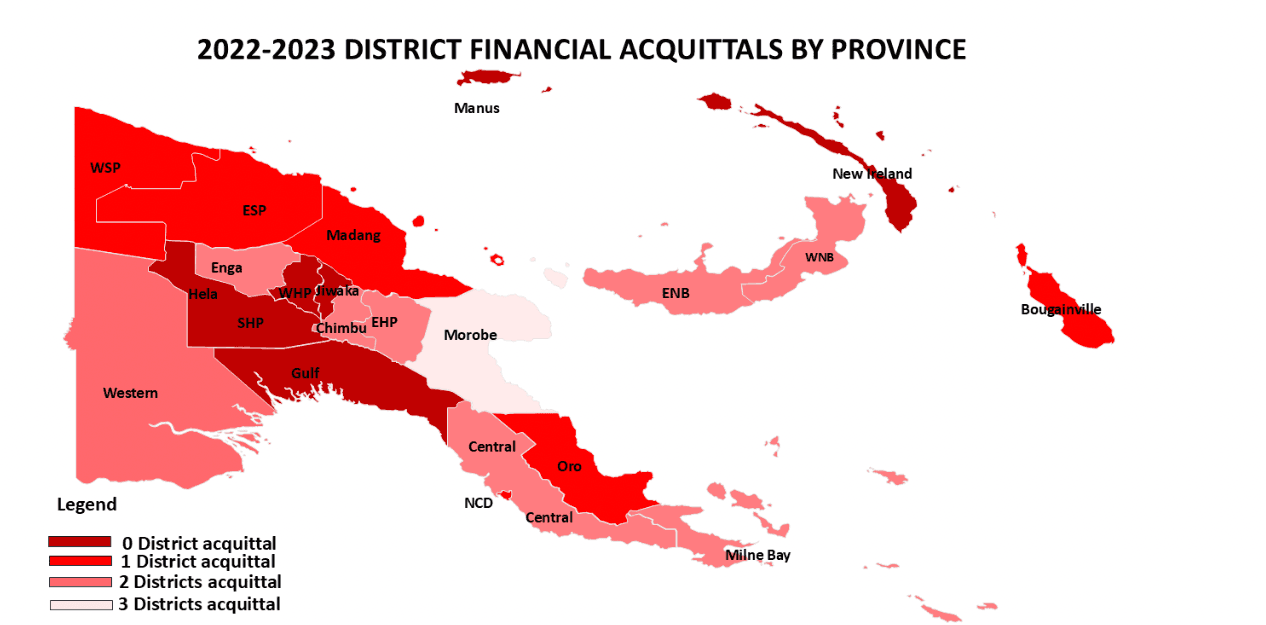
Breaking the numbers down by region, the Highlands region is performing the worst when it comes to accounting for its spending:
- Highlands: 7 districts out of 36 have filed acquittals (19%);
- Momase: 6 districts out of 23 have filed acquittals (26%);
- Southern: 6 districts out of 21 have filed acquittals (29%);
- Islands: 5 out of 13 have filed acquittals (39%);
ACT NOW! has also identified seven provinces in which none of the districts have filed a financial acquittal for 2022 or 2023: Hela, Jiwaka, Western Highlands, Southern Highlands, Gulf, Manus and New Ireland.
Although, Morobe stands out as the province with the highest number of Districts (three) that have dutifully submitted their financial acquittals for 2022 or 2023, this still only represents 30% of the ten Districts in the province. Nationally, just 25% of Districts have submitted their 2022 or 2023 acquittals.
The District Services Improvement Program (DSIP) and District Infrastructure Program (DIP) should be used to deliver decent public services to local communities. But the lack of district planning and the failure to acquit how funds are being used raises questions about the proper use of public monies and the effectiveness of the programs intended to improve the lives of citizens.
3. Lack of 5 Year District Plans
A lack of proper planning at the district level is a critical failure that is undermining the delivery of quality health and education services across Papua New Guinea.
Research by ACT NOW! has revealed that two-years on from the last national election, just one quarter or 25% of districts have published a five-year development plan for 2023-27.
Good planning is essential for the delivery of quality services so it is shocking to see that despite Districts now receiving K20 million a year in service improvement and infrastructure funding, most do not have a clear roadmap for how they are using the money. This lack of planning is a major reason for deteriorating local services and the suffering endured by the communities.
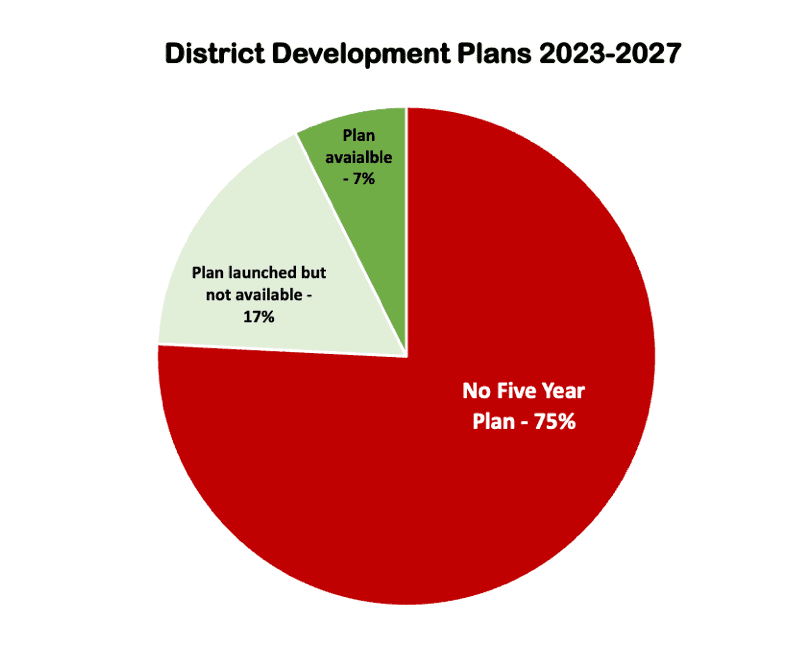
The lack of proper planning across most Districts also undermines transparency and accountability, with both the general public and key governance institution left in the dark about the management, monitoring, and utilization of district funds.
In the analysis it was shocking to find that only 7 District plans are publicly available and that 75 Districts out of 96 have yet to announce a plan for 2023-27. Also, no district has yet published an annual budget for 2023 or 2024.
While ACT NOW! commends the 21 Districts that have launched a plan and we are calling on them to ensure the plans are available to their constituents. Meanwhile, we are urging the Department of Finance to stop sending money to those Districts that have yet to produce a plan.
Compounding the problem with a lack of planning, ACT NOW! has found only 40 Districts have filed an acquittal of their spending with the Department of Implementation and Rural Development (DIRD) over the last 12-months. Only 24 of those acquittal reports were for spending in 2023 or 2022, the other 18 were for earlier years.
This lack of acquittals raises serious questions about financial accountability at a District level.
It is the responsibility of government to address these concerns head-on to ensure effective service delivery and good governance so it can deliver meaningful development. Members of the public must demand greater transparency and accountabilty from their local MPs, district CEOs, DDAs and public official officials.
DDA CEOs are subject to the Leadership Code and must be seen to adhere to the terms and conditions of the law that governs their conduct. Some of their role include develop proper five year district development plans, acquitting DSIP funds on a timely manner, providing contact details and making their presence accessible to its people. However, ACT NOW! analysis has shown these are lacking in the districts since the introduction of DDAs in 2014. Yet the govenment keeps on increasing funding for DDAs with no concern for transparency and accountability.
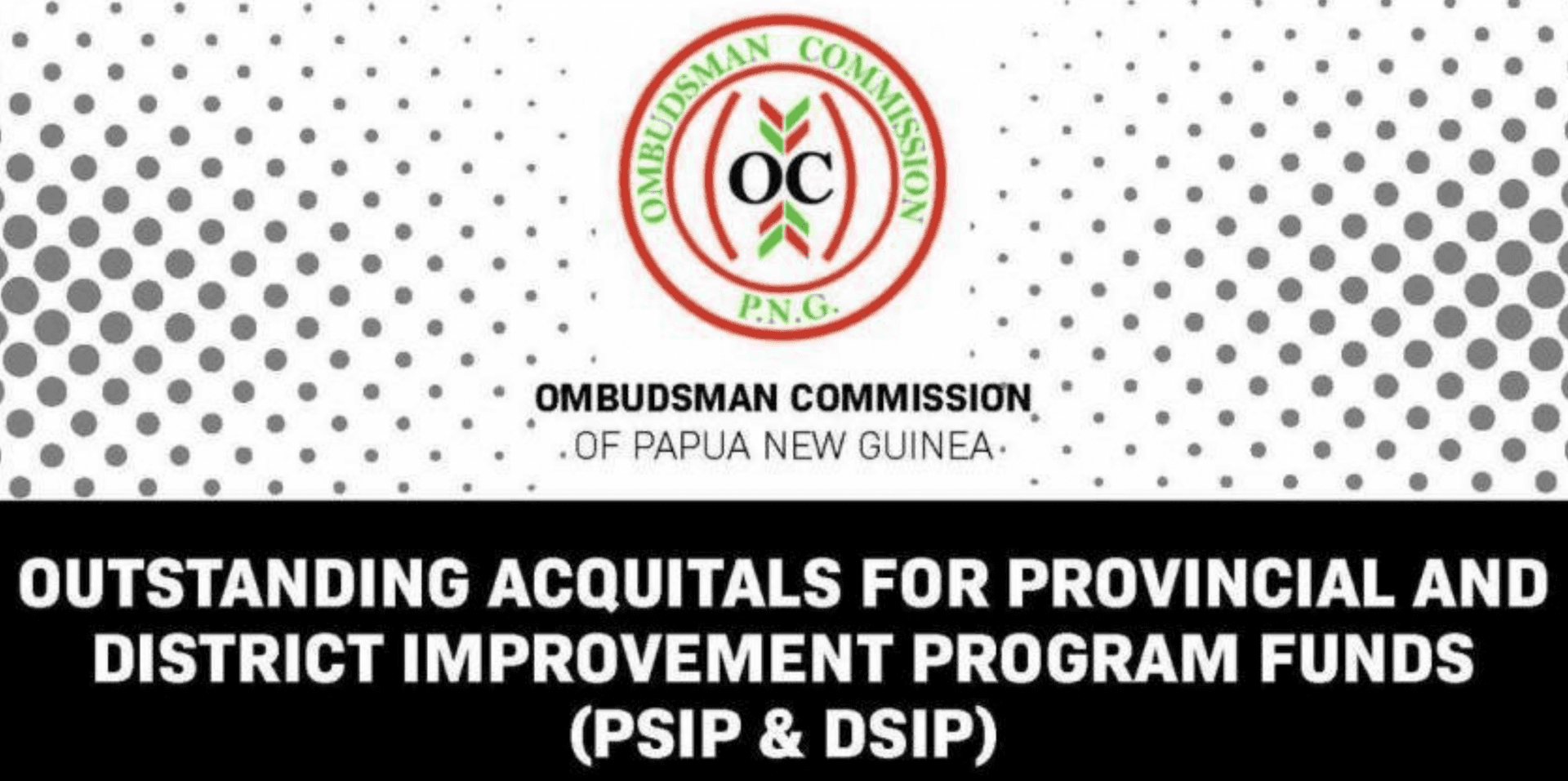
Call for Action:
- Citizen Engagement: We urge citizens to actively engage with their DDAs, demanding transparency, accountability, and adherence to good governance practices.
- District Planning: All DDAs must publish a 5-year development plan and make that plan available to the public
- DSIP Accountability: DDAs must promptly release detailed DSIP and DIP acquittal reports to restore public trust.
- Budget Transparency: All Districts should publish their budgets, ensuring openness and fiscal responsibility.
- Leadership Action: All DDAs to publish the names of their CEO, and contact phone, email and postal addresses.
- Leadership Code Enforcement: The Ombudsman Commission (OC) should take action under the Leadership Code against CEOs and DDA Board chairs who fail to publish plans, acquittals or contact details.
- Funding Restrictions: The Department of Finance should stop distribution of further DSIP (District Services Improvement Program) and DIP (District Infrastructure Program) funds to districts with no plans, acquittals or contact details.
- Audit Expansion: Government increase funding to the Auditor-General’s Office (AGO) to enable it to conduct audits for all 96 districts.
Together, let's build Districts that serve our communities and thrive through transparency.
For more information about your district, visit www.ddawatch.org
